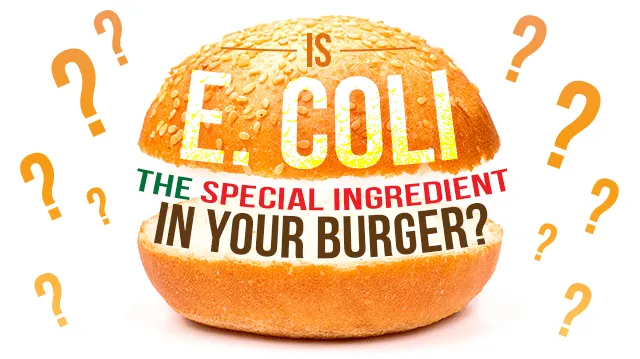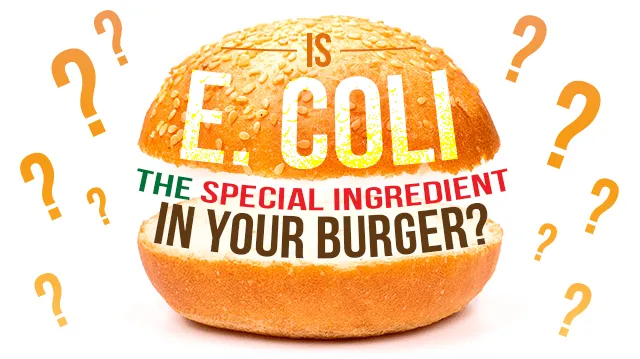
- Share on Facebook12
- Share on Pinterest
- Share on Twitter
Bacteria may be the secret ingredient in your burger, turning your meal from delicious to dangerously toxic. A recently released Consumer Reports study uncovered the fact that a large quantity of the packaged ground beef you purchase in the supermarket contains at least one type of harmful bacteria. This is alarming, since America buys 4.6 billion pounds of ground beef annually.
You may barbecue burgers, or use ground beef in casseroles and many other dishes you put on the table for your family to enjoy. But what are you really serving them? Beef, if not cooked properly poses a big threat to you and your family’s health and well-being. According to the Consumer Reports study, “Beef, and especially ground beef, has a combination of qualities that can make it particularly problematic — and the consequences of eating tainted beef can be severe.”
You may remember the July 4th holiday beef scare, when over 13 tons of ground beef was recalled due to the possibility of an E. coli O157:H7 outbreak. E. coli O157:H7 is a very dangerous strain of bacteria which can cause kidney failure in severe cases.
Urvashi Rangan, the lead investigator for the study, and executive director of the Food Safety and Sustainability Center at Consumer Reports found disturbing results. There was at least one bacteria noted in every package of the 300 samples taken from 26 cities across America. E. coli was not found in the beef; however, the study recorded several other bacterias, which can cause food poisoning and similar symptoms.
The Centers for Disease Control and Prevention (CDC) statistics on foodborne diseases revealed that 48 million Americans get sick due to bacteria in their food every year. That is one in six, with 128,000 Americans hospitalized and an annual death toll of 3,000. Two of the most common and dangerous bacterias found in the study were Clostridium perfringens and Staphylococcus aureus.
One other very interesting fact found in the Consumer Reports study was the difference in bacteria percentages between non-organic and organic ground beef. The study found an 82 percent bacteria prevalence in non-organic beef, in comparison with only 58 percent in organic ground beef. There is something to be said about this difference, since it significantly reduces your and your family’s chances of getting a foodborne illness. “We think consumers should buy better beef (such as sustainable labels) and handle it more safely,” Rangan commented in a CNN interview.
What’s the alternative? For all those organic meat lovers, karma rewards you with a lesser chance of eating bacteria burgers. For those on the fence about buying organic meat, or for those who need to consider their budget — like most Americans — it’s important to also consider the pricey hospital and medication bills that a serious bout of food poisoning can incur. On average, a trip to the emergency room costs $1,233 according to a 2013 Fox News report.
 Organic meat, especially from grass-fed animals, contains more essential nutrients you and your family need to live long, healthy lives, free of food poisoning and other diseases. Organic meat has been found to contain two to four times more health boosting omega-3 fatty acids and three to five times more conjugated linoleic acid (CLA), two ingredients for preventing cancer and other chronic diseases. Not only is organic beef better for your health, it is also absolutely delicious.
Organic meat, especially from grass-fed animals, contains more essential nutrients you and your family need to live long, healthy lives, free of food poisoning and other diseases. Organic meat has been found to contain two to four times more health boosting omega-3 fatty acids and three to five times more conjugated linoleic acid (CLA), two ingredients for preventing cancer and other chronic diseases. Not only is organic beef better for your health, it is also absolutely delicious.
Besides the omega-3 and CLA benefits, let’s look at what other essential nutrients organic, grass-fed beef has to offer for every four ounce serving.
Percentage daily value (DV):
Vitamin B12: 60%
Protein: 52%
Vitamin B3: 48%
Vitamin B6: 44%
Selenium: 44%
Zinc: 37%
Do you know what bacteria is lurking in your beef? Is your beef organic? Putting in a bit of diligent research, and going over your budget to purchase organic ground beef, could possibly keep you and your family healthier. The time and money spent on an ER visit can be far more expensive. Not to mention the bacteria, diseases and dangers you may be exposed to in the hospital. Eating organic is a healthy choice, and an ethical choice. You are saying yes to the fair treatment of animals, while ensuring their lives are worth the bounty they offer you and your family at the dinner table.
It is not so uncommon to pair up with another family and visit a local farm that offers 100-percent grass-fed, organic beef and split a cow. You can often purchase a cow together, see it in the pasture grazing, know where it comes from and what it eats, giving you peace of mind. This will keep you and your family from the bacteria so commonly found in packaged ground beef today. What’s in your fridge?
-Stephen Seifert
Stephen Seifert is a writer, professor, adventurer and a health & fitness guru. His flare for travel and outdoor adventure allows him to enjoy culture and traditions different than his own. A healthy diet, routine fitness and constant mental development is the cornerstone to Stephen’s life.
Sources:
http://www.consumerreports.org/cro/food/how-safe-is-your-ground-beef.htm
http://www.cdc.gov/foodborneburden/
http://www.cdc.gov/features/clostridiumperfringens/
http://www.cdc.gov/ncidod/dbmd/diseaseinfo/staphylococcus_food_g.htm
- Share on Facebook12
- Share on Pinterest
- Share on Twitter

